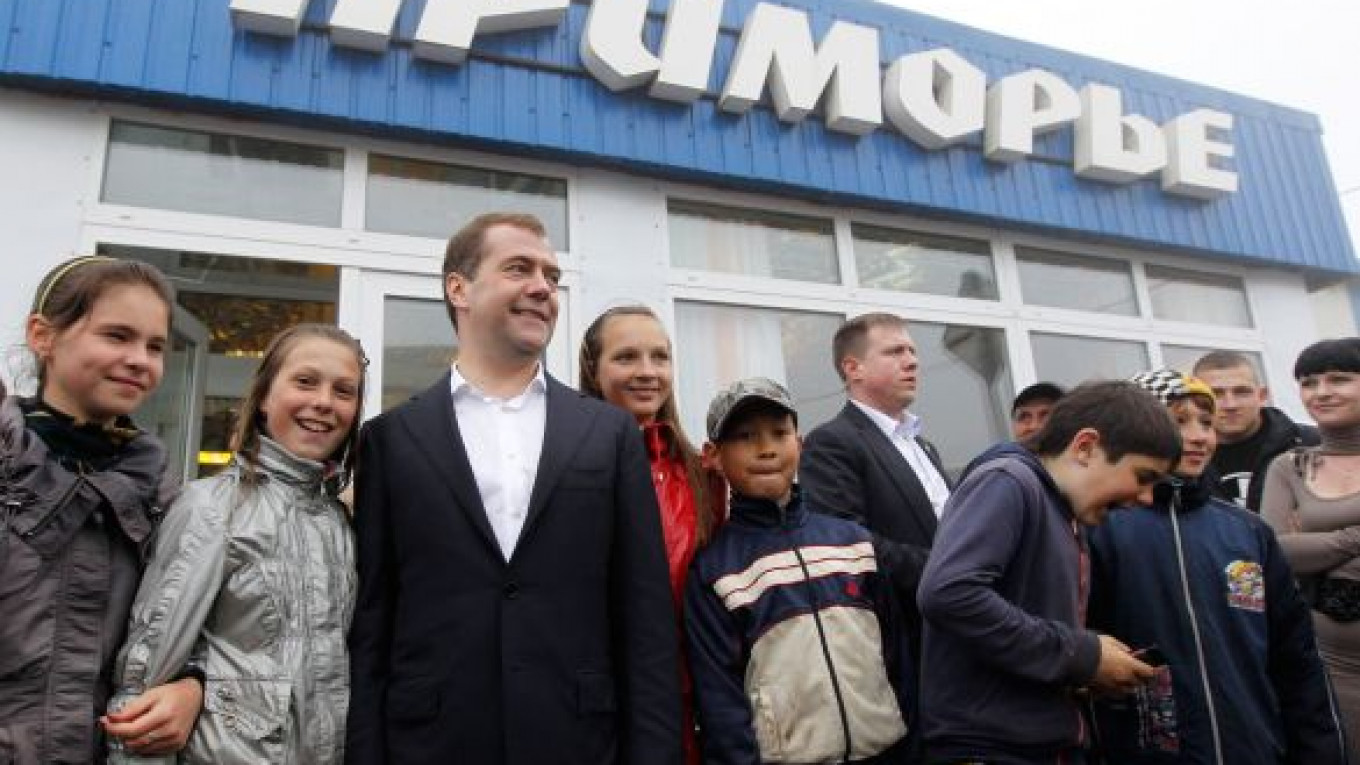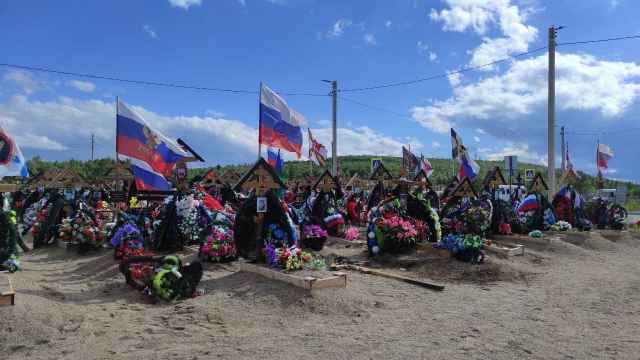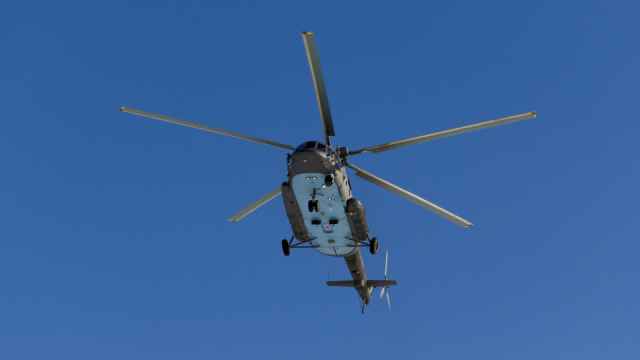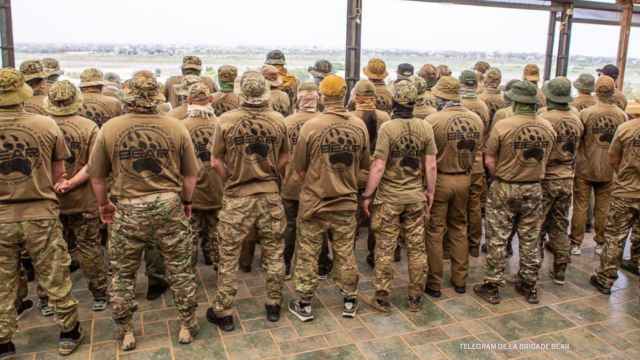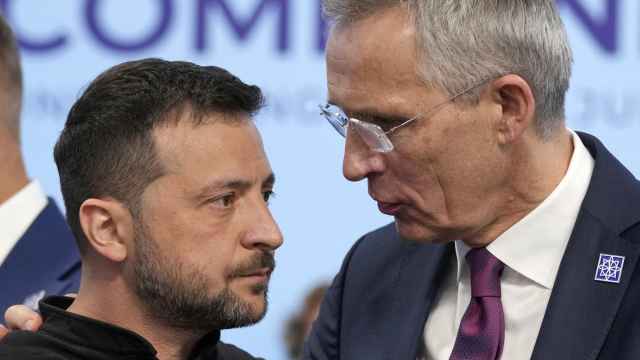In a visit that left Japan seething, Prime Minister Dmitry Medvedev traveled Tuesday to a disputed Pacific island and pledged to boost financing for four impoverished islands whose ownership has been disputed by Tokyo since World War II.
Russia captured the islands — known as the Southern Kurils in Russia but as the Northern Territories in Japan — in 1945, but Japan still claims them as its own.
For nearly seven decades, the dispute has prevented Moscow and Tokyo from signing a peace treaty to formally end their hostilities.
Surrounded by rich fishing waters, the islands are believed to have offshore hydrocarbon reserves, gold and silver deposits.
"The islands of the Kurils are … our territory, which should develop just like the mainland of our country," Medvedev told reporters in the city of Yuzhno-Sakhalinsk before departing by plane to Kunashir Island. "We have to develop new investment projects, including those with the participation of foreign firms."
During a meeting with Kunashir officials, Medvedev pledged to allocate more government funding for the construction of fisheries and roads.
"Our easternmost region cannot be the most deprived one," Medvedev said in televised remarks.
Since the Soviet collapse, the island chain has suffered neglect, and its population has plummeted. Many remaining residents have resorted to poaching fish and crustaceans, which are then sold illegally to Japan, South Korea and China.
In Tokyo, Japan's Foreign Ministry summoned Russia's envoy to complain about the visit.
This "is a territory inherent to Japan. Therefore a visit of this kind is unacceptable for Japan and deeply regrettable," Deputy Foreign Minister Kenichiro Sasae told Russian Ambassador Yevgeny Afanasiyev.
Japanese Foreign Minister Koichiro Gemba, who is scheduled to travel to Moscow this summer for talks on the territorial issue, also protested Medvedev's trip.
"Medvedev's visit to Kunashir pours cold water on our relations," he said, Interfax reported.
Foreign Minister Sergei Lavrov dismissed the criticism.
"We have to move toward a peace treaty, but not through renewed protests, whether reasonable or not," Lavrov said in Moscow.
In 2005, Russia suggested that it would cede two of the islands if Japan gave up its claim to the other two, but Japan rejected the idea.
The islands lie off Russia's eastern coast, some 7,000 kilometers from Moscow. The island of Kunashir, where Medvedev landed, is a mere 15 kilometers away from Japan's northern island of Hokkaido.
The Russian government has dedicated new funds and political attention to boost Moscow's presence in the country's vast but sparsely populated Far East in advance of the Asia Pacific Economic Cooperation summit in Vladivostok in September.
Following Vladimir Putin's return to the presidency in May, Russia also created the Far East Development Ministry. Viktor Ishayev, the ministry's leader, traveled with Medvedev along with the regional development minister, Oleg Govorun.
In 2010, Medvedev became the first Russian leader to visit the islands as president. After that visit, he promised to bolster an artillery division deployed on the islands.
Japan claims that Soviet troops took control of the islands illegally, and it has consistently called for their return as a precondition for fully improved ties.
Nikolai Makarov, chief of the armed forces general staff, has said Russia may send Mistral-class helicopter carriers it is buying from France to the Pacific to help protect the islands, although some analysts believe the move is actually aimed at boosting the country's defenses against the rising strength of neighboring China.
(AP, Reuters)
A Message from The Moscow Times:
Dear readers,
We are facing unprecedented challenges. Russia's Prosecutor General's Office has designated The Moscow Times as an "undesirable" organization, criminalizing our work and putting our staff at risk of prosecution. This follows our earlier unjust labeling as a "foreign agent."
These actions are direct attempts to silence independent journalism in Russia. The authorities claim our work "discredits the decisions of the Russian leadership." We see things differently: we strive to provide accurate, unbiased reporting on Russia.
We, the journalists of The Moscow Times, refuse to be silenced. But to continue our work, we need your help.
Your support, no matter how small, makes a world of difference. If you can, please support us monthly starting from just $2. It's quick to set up, and every contribution makes a significant impact.
By supporting The Moscow Times, you're defending open, independent journalism in the face of repression. Thank you for standing with us.
Remind me later.



